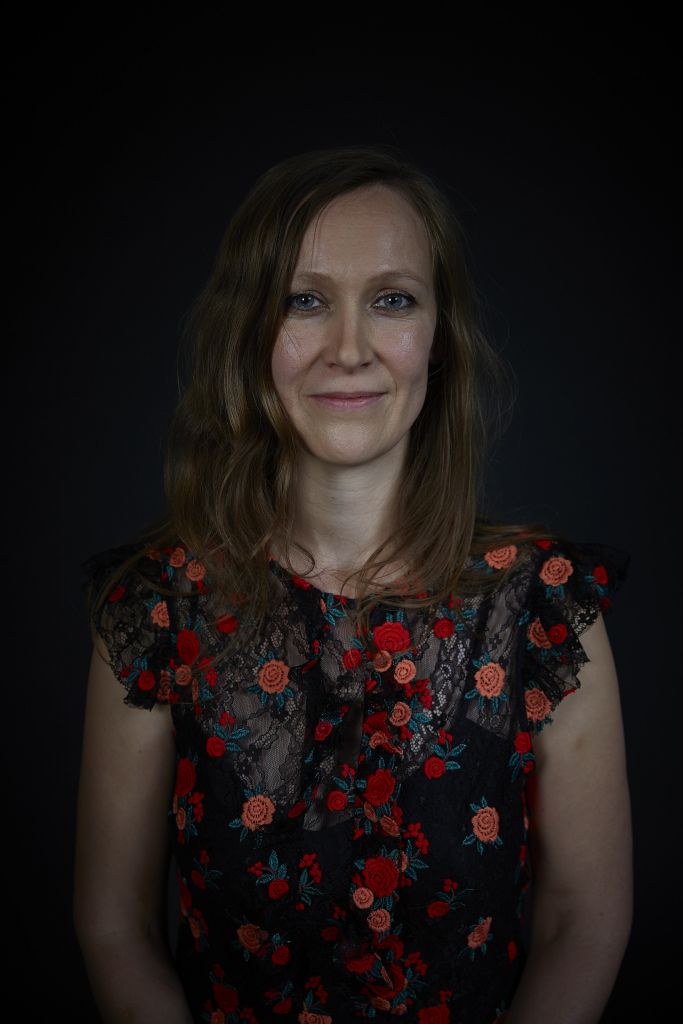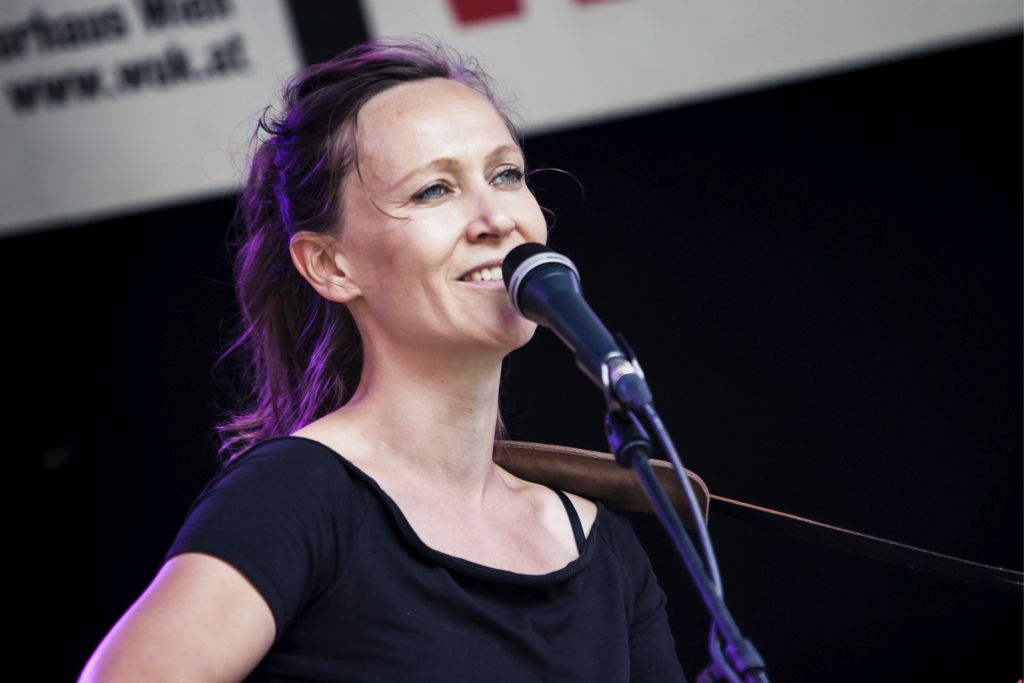Die fünfmonatige Bildungskarenz anlässlich der Nachgraduierung der studierten Musiktherapeutin fällt in den Beginn der Corona-Pandemie. Warum sie dem plötzlichen Stillstand auch etwas Positives abgewinnen kann und weshalb sie bei ihrem sechsten Album nicht mehr von anderen abhängig sein möchte, erklärt Sibylle Kefer im Gespräch mit dem mdw-Magazin.
Schon früh gehört Musik zum Leben der Ausnahmekünstlerin, der Vater gibt Volksmusikabende, die Mutter unterrichtet Klavier in ihrem Kinderzimmer. Mit zehn Jahren erhält Sibylle Kefer Querflötenunterricht. „Als Jugendliche wollte ich mich dann auch mit anderen Instrumenten auseinandersetzen. In der Musikschule habe ich Querflöte, Klavier und später Schlagzeug gelernt, mein Vater hat mir zu Hause Akkorde auf der Gitarre gezeigt.“ Zusätzlich spielt Kefer im Bezirksjugendorchester sowie in der Blasmusikkapelle und leitet sogar eine Jugendkapelle. „Ich habe die ganze Woche darauf gewartet, im Orchester zu spielen; man könnte sagen, ich habe für die Musik gelebt.“ Die junge Musikerin hat immer mehr Ideen für neue Instrumente. „Prinzipiell wollte ich immer sehr viel von dem, was mich interessiert hat, und das andere, wie die Schule, ganz wegmachen“, lacht die gebürtige Oberösterreicherin.
Ich habe für die Musik gelebt. Das war das Schönste für mich.
Zum ersten Mal in Kontakt mit der Studienrichtung Musiktherapie kommt Sibylle Kefer bei dem Besuch einer Berufsinformationsmesse. Die Verbindung ihrer zwei größten Leidenschaften – Musik und Soziales – weckt das Interesse der passionierten Musikerin. „Musiktherapie war mein Wunschberuf, hätte das nicht geklappt, hätte ich mich für Sozialarbeit entschieden.“ Nach einem Jahr Vorbereitung wird sie schließlich zum Kurzstudium Musiktherapie an der mdw zugelassen.
Sibylle Kefers zweites Standbein neben der Musiktherapie ist der Jazzgesang. Mit 17 Jahren hört sie ein Konzert der Jazzsängerin Ines Reiger in Hallstatt. Dieser Auftritt motiviert sie zum Besuch mehrerer Seminare in Scheibbs und Zeillern. Ihre Ausbildung im Jazzgesang sowie ihre künstlerische Tätigkeit finanziert sich die vielseitige Künstlerin durch ihre Arbeit als Musiktherapeutin. „Die Musiktherapie hat mir nicht nur ermöglicht, meine Ausbildung als Jazzsängerin, sondern auch meine Band während der ersten Projekte besser bezahlen zu können. Das war mir wichtig.“
Aktuell arbeitet die ausgebildete Jazzsängerin an ihrem sechsten Album. „Ich habe mehrere Producing-Workshops gemacht, damit ich nicht mehr von anderen abhängig bin und die Musik so klingt, wie ich mir das vorstelle. In dieses Album möchte ich all meine eigenen Themen einfließen lassen.“
Ich konnte nie genug lernen und hatte immer wieder Ideen für neue Instrumente.

Rund zwanzig Jahre nach ihrer Ausbildung zur Musiktherapeutin entscheidet sich Sibylle Kefer für die Option der Nachgraduierung, um das Diplom für Musiktherapie, das damals noch nicht angeboten wurde, zu erwerben. „Der Beginn meiner Bildungskarenz fiel letztes Jahr genau mit dem Ausbruch der Covid-19-Pandemie in Europa zusammen. Ich war zu diesem Zeitpunkt sehr arbeitsmüde und brauchte dringend eine Pause. Ich bin in einem tollen Team, und es ist sinnvoll, was ich tue, aber es ist auch sehr anstrengend.“ Der berufliche Abstand verschafft ihr die Möglichkeit, neue Kräfte zu sammeln und wieder neu durchzustarten. Sie beschäftigt sich intensiv mit ihrem Diplomarbeitsthema „Kontrollverlustängste bei Kindern in einer bindungsorientierten Musiktherapie“ und schließt das Diplomstudium im November 2020 erfolgreich ab. „Ich war dankbar, mich in dieser Zeit auf meine wissenschaftliche Arbeit konzentrieren zu können. Zudem hatte ich auch wieder mehr Zeit für meine Familie und für mich selbst. Das hat mir gutgetan. Der pandemiebedingte Stillstand des Systems ist mir dabei entgegengekommen.“ Gleichzeitig ist Sibylle Kefer besorgt, welche Auswirkungen dieser Umbruch mit sich bringt. „Das hat mich natürlich sehr beschäftigt und mir auch Angst gemacht. Vor allem auch, was das mit den Kindern und Jugendlichen macht.“ Deren Umgang mit der Coronakrise findet Kefer höchst bewundernswert. „Die jungen Leute sind so flexibel. Sie mussten viele Abstriche machen, haben auf die anderen aufgepasst und dafür kaum Zugeständnisse bekommen.“ Resilienz spielt hier laut der gelernten Musiktherapeutin eine große Rolle. „Es geht darum, sich zu verknüpfen und in Kontakt zu bleiben. Man muss sich neu strukturieren und ordnen.“
Was ich in meiner Ausbildung zur Therapeutin gelernt habe, ist, dass es viele Wege gibt, mit Erlebtem umzugehen.
Auch die dreifache Mutter empfindet die Corona-Zeit als große Herausforderung, die Struktur im Homeschooling zu halten, fällt schwer. „Um meinen Kindern eine Freude zu machen, habe ich mich kurzerhand entschlossen, mit ihnen gemeinsam ein Hörspiel zu entwickeln.“ Die gesamte Familie inklusive Großeltern beteiligt sich und spricht Texte ein. „Wir haben Lieder geschrieben und sie anschließend aufgenommen, das war für uns alle ein tolles Erlebnis.“ Mit welcher Haltung Eltern einer Krise begegnen, wirkt sich auch auf das Verhalten der Kinder aus, weiß die Pädagogin. „Eltern ermöglichen ihren Kindern die Fähigkeit zur Resilienz, wenn sie aus schwierigen Situationen etwas Positives mitnehmen können.“
Nach der Rückkehr aus der Bildungskarenz gehören Corona und die damit einhergehenden Sicherheitsmaßnahmen zu ihrem Alltag als Kindermusiktherapeutin. „Wir mussten kleine Kinder, die zum Teil an Sprachentwicklungs- oder Kontaktstörungen leiden, mit Maske betreuen. Das habe ich als große Herausforderung empfunden.“

Generell empfindet die Musiktherapeutin es als wichtig und hilfreich, resilient zu sein. Ebenso wichtig ist es aber, als Gesellschaft für diejenigen da zu sein, die Hilfe brauchen. „Es wäre schade, wenn alle nur für sich alleine kämpfen würden. Kunst ist verletzlich und brüchig und soll authentisch bleiben können. Schwach zu sein ist ebenso menschlich, wie stark zu sein. Alle Facetten sind wichtig.“

